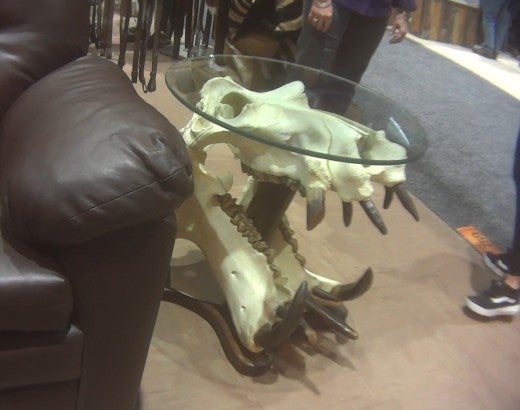With their barrel shape, huge teeth and jaws that can open to almost 180 degrees, hippos are characteristically unique and one of the world’s most recognizable animals. Hippos are also a keystone species: As “ecosystem engineers,” their behavior helps shape and maintain landscapes and habitats and promote biodiversity. Their presence is indispensable to the African lake and river areas they inhabit.
Yet these magnificent animals face a high risk of extinction and are disappearing from the wild. Habitat loss due to human activity, climate change and drought threaten hippos’ survival, and these threats are further exacerbated by poaching and the ivory trade. Our recent undercover investigation reveals the current—and growing—interest in hippos and their parts from both traders and trophy hunters.
During the past decade, collectors in 60 countries imported over 75,000 hippo parts and products (equivalent to nearly 13,500 individual animals). Collectors in the United States were responsible for bringing in more hippo parts and products—including thousands of teeth, trophies, skins and more—than their counterparts in any other country.
The U.S. also has the unfortunate distinction of harboring the most trophy hunters. They travel thousands of miles overseas and pay thousands of dollars to shoot and kill hippos in the water, likely while the animals are resting. Many hunters leave the hippos’ corpses behind and return home with just 12 teeth as their “trophies.” (The teeth often end up mounted and displayed, either on a wooden plaque or in a replica hippo shoulder mount.)
This selfish slaughter must stop. That’s why we’re calling on the U.S. Fish and Wildlife Service to list hippos under the Endangered Species Act and help protect them from this cruel and ecologically reckless trade. Doing so would significantly restrict the U.S. import and sales of hippo items—a vital, urgent step toward enhanced protection of hippos in the wild.

Our undercover investigation revealed a thriving market of hippo parts and products available in stores throughout the United States and on websites, including carved tusks; ivory-handled knives; purses, belts and boots made of hippo skin; and a table made with a hippo skull intended to serve as “home décor.”
Some of the items we found in the United States may have been illegally acquired or traded due to the lack of effective law enforcement. Our comprehensive analysis revealed that a very large and biologically significant amount of hippo poaching, trafficking and illegal trade continues today. We estimate that in just four short years (2016 to 2020), over 6,750 hippos were illegally killed, but this number is likely a fraction of the true total—given the very nature of the trade, we can’t know for sure.
In our undercover investigation, sellers were vague and unclear about how their products were obtained. Some of the items were offered for sale at Safari Club International’s conventions in Nevada, a state that generally prohibits selling or purchasing products made from hippos. Our investigation revealed sellers suggesting that buyers skirt Nevada state law by ordering online and having items shipped to their homes.
As the largest consumer market for hippo parts and products, the United States must act swiftly to save these iconic mammals. No current U.S. or international law adequately protects hippos from these threats to their survival, but together, we can end our nation’s role in exacerbating the dangers this vulnerable species already faces—all while bringing awareness to one of the most well-recognized and celebrated icons of African biodiversity.
Sara Amundson is president of the Humane Society Legislative Fund.



